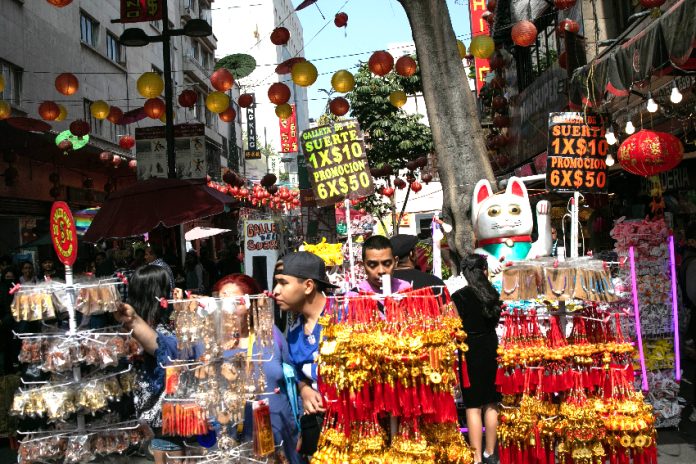Chinese commerce is conquering the historic center of Mexico City, where huge Chinese-operated wholesale centers are filled to the brim with products made in the East Asian economic powerhouse and scores of buildings have been turned into warehouses to store the goods.
This week, the Reforma newspaper has published a series of articles on what it described as a “tsunami of Chinese commerce” in the capital’s downtown in the post-pandemic period.
Its reporting delves into the significant and very notable changes that have occurred in the centro histórico as a result of the proliferation of Chinese-operated establishments, and reveals that at least some Mexicans are far from happy about the situation.
Chinese shopping plazas and warehouses
Reforma reported that at least four Chinese-operated “macroplazas,” or large wholesale shopping complexes, have opened in a 1-square-kilometer area of Mexico City’s historic center.
The area, located just south of Mexico City’s main square, has turned into a kind of Chinatown replete with Chinese restaurants and supermarkets.
The macroplazas supply (mainly) cheap Chinese-made products of all types to both formal businesses and vendors who work in the informal economy, selling goods in the street or in the capital’s elaborate subway system, for example.
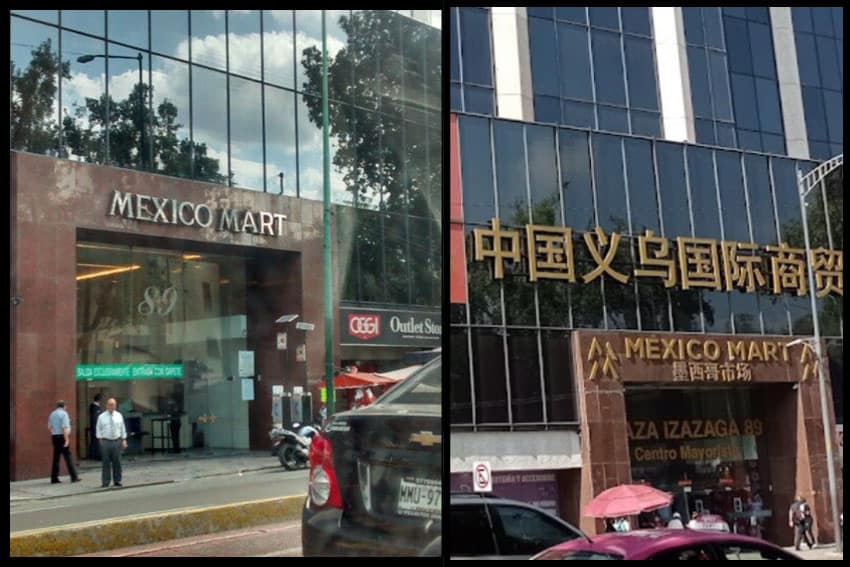
The largest of these shopping plazas is a 16-story building on Izazaga Street that has some 40 wholesale stores per floor. In Spanish, it’s called Mexico Mart or Plaza Izazaga, but a sign in Mandarin identifies it as the International Trade City of Yiwu, China.
The building, which sustained some damage in a 2017 earthquake when it housed Mexico City government offices, “is a pioneer in the sale of thousands of products brought [to Mexico] from China,” Reforma reported.
The newspaper said that the managers of the stores in Mexico Mart and other Chinese macroplazas are Chinese while most of the rank-and-file employees are immigrants from Latin American countries such as Honduras and Venezuela. Those workers are paid in cash and don’t have contracts or access to benefits, Reforma said.
According to Reforma, the Chinese owners and managers of the wholesale stores have “armies of diableros,” or hand truck operators, who move goods around the historic center of Mexico City, including from warehouses to the shopping plazas.
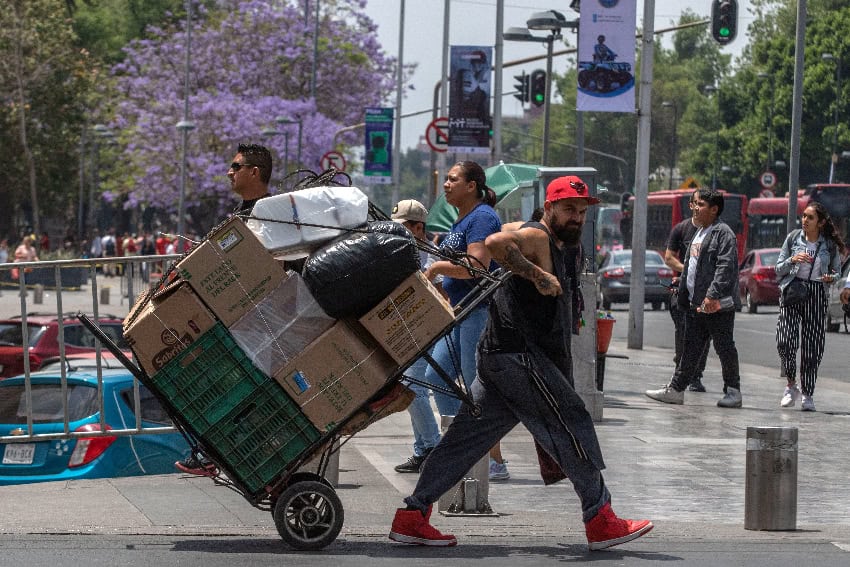
Jesús Rodríguez, president of the Mexico City Chamber of Commerce, told Reforma that the downtown has become a “bodegón” or large warehouse for Chinese products.
José Santiago, a long-term owner of a bridal wear store on Chile Street, said that at least 100 buildings in the historic center — some of which were recently restored with public money — have been partially or wholly converted into warehouses for Chinese products.
Many Mexican-owned businesses — and a significant number of residents — have been displaced as a result. Among the shops that have closed down are ones that sold bridal wear, handmade shoes, books, textiles, religious items and furniture.
Rents soar due to the influx of Chinese commerce
According to business owners, commercial spaces that were rented for 20,000 or 30,000 pesos (US $1,100 to $1,600) per month last year have been turned into warehouses and are now rented for 50,000–90,000 pesos (US $2,700 to $4,900) per month.
Reforma reported that people who introduce themselves as lawyers have approached the historic center property owners to inquire about rental prices and subsequently offered to pay double or triple in order to turn the spaces into warehouses for Chinese products. Existing tenants who are unable to match the offers have, in many cases, been asked to leave or evicted.
“I don’t blame those who rent the [spaces to Chinese businesses] … because we’re coming out of a pandemic, we’re coming out of years of an economy restricted to subsistence,” said Santiago, the bridal store owner.
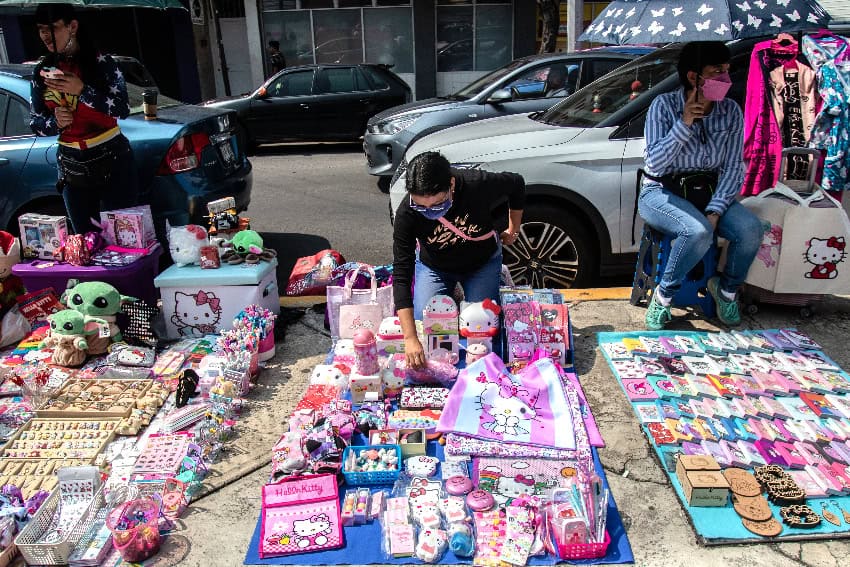
However, he complained that local businesses have been displaced by commerce “that supplies street and Metro vendors.”
Santiago also said that he and other business owners have seen a significant decline in their sales because fewer people are coming to shop in the historic center, turned off by the reduction in the number of stores and the many diableros moving products through the streets.
They’re ‘destroying’ the streets of CDMX centro
Santiago asserted that the “armies” of hand truck operators — which have been a common sight in Mexico City for years — are “destroying what has just been built in the streets of the [historic] center.”
“They destroy the ground with such big loads, the bollards, the trees. And they get in the way. One day — a Sunday — the firefighters couldn’t get past,” he said.
“If you try to put a ladder [on the sidewalk] to clean your sign, the hand trucks knock you over,” he said, adding that motorbikes pulling trolleys laden with goods also cause problems by going down one-way streets in the wrong direction.
“I can’t understand how it’s possible that this is happening in the centro,” Santiago said.
“… Where’s the urban plan? Why did they allow the warehouses?”
Workers lose their jobs
The takeover of commercial spaces by warehouses inevitably led to a loss of jobs by people who were employed by the shuttered businesses.
One such person is former clothing store employee Mary Gudiño, who had worked at the same business for 36 years. Many other stores in the same area also closed when their owners were unable to match the high rents offered by Chinese businesses.
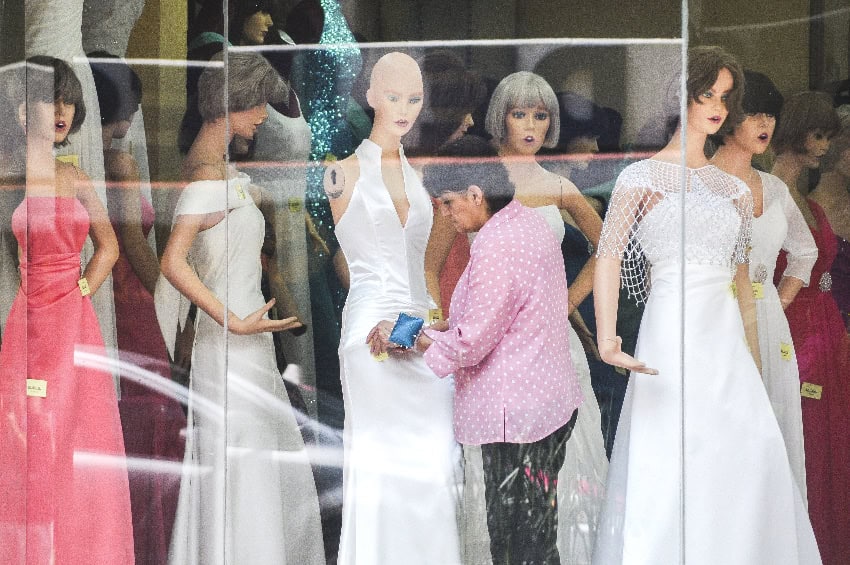
“I’m sad, what’s happening is frustrating,” Gudiño told Reforma.
“The golden age [of commerce in the historic center] was 30 years ago; we couldn’t keep up with attending to people,” she said.
“… Today there is no control over rents, … a lot of stores closed and now, the truth is, [customers] don’t come,” said Gudiño, who found another retail job but fears that her new employer will be forced to shut down as well.
She also expressed concern about the conditions faced by the diableros, who often transport extremely heavy loads, placing themselves at risk of accident or injury.
“I would ask the government to have more awareness, … to not allow the country to be sold. It can’t be possible that [Chinese businesses] put all these things [in warehouses] and our companies with Mexican people are closing,” Gudiño said.
Chinese entrepreneurs make handsome profits
According to Reforma, Chinese products sold in the Mexico City macroplazas mainly enter the country at the Mexico City International Airport, and at the port in Lazáro Cárdenas on the Pacific coast of Michoacán, where illicit goods such as the chemicals used to make fentanyl also come into Mexico from China.
One of the Chinese entrepreneurs that sells Chinese-made goods in the historic center is known by his employees as “Jin Lan” — the name of a brand of bathroom products — because they don’t know how to pronounce his real name, Reforma said.
The newspaper reported that the entrepreneur — like many other Chinese business owners in Mexico City — comes from Zhejiang, a province on the East China Sea below Shanghai.
“Jin Lan” started with one store in Mexico Mart but now has at least seven shops in different macroplazas in the historic center of Mexico City. Reforma said he “has seen his income grow like foam” — i.e. very rapidly.
The businessman doesn’t speak Spanish but manages to communicate with his employees by “shouting and waving his hands about,” according to one worker.
The unnamed employee told Reforma that workers — many of whom are migrants to Mexico — are paid just 1,200 pesos (US $65) per week in cash, excluding sales commissions.
He acknowledged that the pay is not much but said he is learning about the business and that his goal is to one day import his own 22-tonne shipping container of Chinese products and compete against the East Asian entrepreneurs.
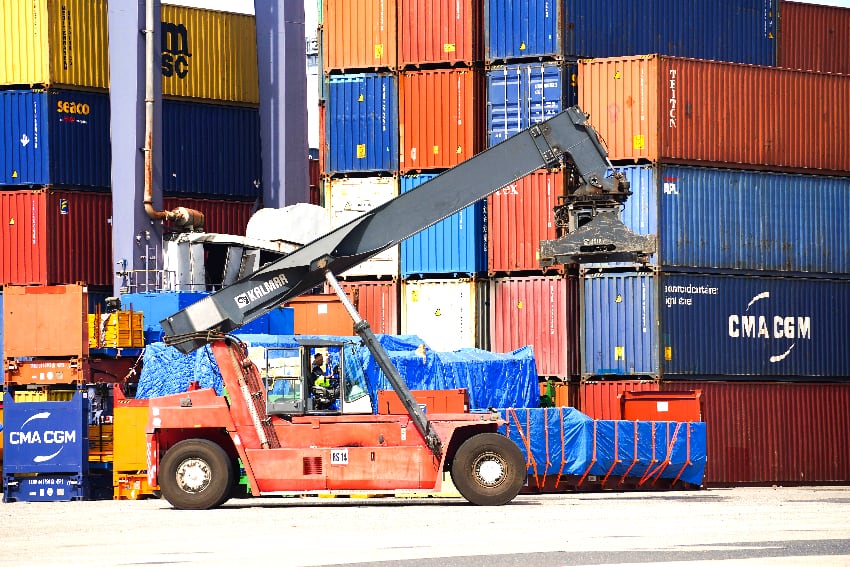
The goods made in China — colloquially known as “the world’s factory — are purchased for mere “centavos” and sold in Mexico for “pesos,” said the employee, a situation that allows businessmen such as “Jin Lan” to make very healthy profits.
“It’s a great business,” the worker added, explaining that vendors who buy goods at the macroplazas to resell them can also mark up the products significantly. “It’s a resellers’ paradise here,” he said.
Everything from shower curtains to scooters to speakers — and virtually any other product you can think of — is available at reasonable prices at the Chinese-run stores in the wholesale centers.
The majority of the products don’t come with a guarantee, Reforma noted.
Huge losses for longtime businesses and tax authorities
Reforma reported that the “massive” influx of Asian goods — mainly Chinese, but also Korean products — and “the growth of macroplazas to sell and distribute them” comes at a huge cost to long-established businesses, as well as to tax collection.
The newspaper said that established businesses have missed out on sales totaling 65 billion pesos (US $3.5 billion) as a result of the new competition they face. They have consequently paid 38 billion pesos less in taxes to Mexico’s tax agency, the SAT, Reforma said, citing information from the Mexico City Chamber of Commerce.
In addition, tax avoidance by Chinese-owned businesses generates additional losses for the SAT.
In many cases, such businesses avoid tax by paying workers in cash and only accepting payments for goods in cash. According to Reforma’s reporting, they also take advantage of loopholes that allow them to avoid paying the value-added tax on products they import from China.
Authorities shut down Mexico Mart, but only for 1 day
In March, Mexico City authorities shut down the 16-story wholesale center on Izazaga Street due to alleged irregularities related to the importation of products, Reforma reported.
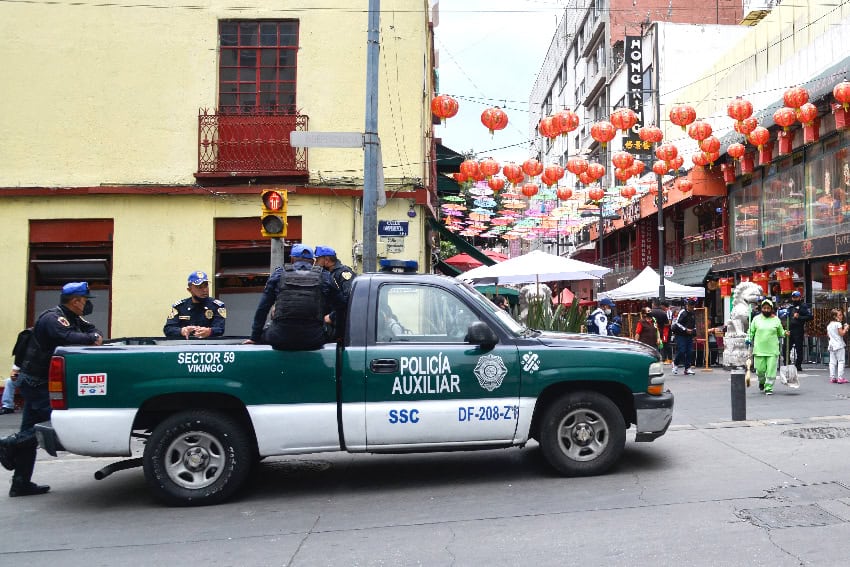
Authorities carried out an investigation aimed at determining whether contraband was being sold at the macroplaza and whether tax evasion was occurring. Most transactions at the stores that operate in the Chinese-run wholesale centers are conducted in cash.
Authorities in the capital spoke about an operation of “great impact” and announced that 3 tonnes of merchandise were seized.
However, the suspension of operations at Mexico Mart lasted only one day, according to Reforma.
Chinese business owners subsequently hired halcones — hawks or lookouts — to give them advance warning of any possible police raids, Reforma said. A warning allows them to close their stores before an operation commences, a former hand truck operator told the newspaper.
Chinese immigration on the rise
Given the influx of Chinese-owned businesses in the historic center of Mexico City – and increased interest from Chinese companies in investing in Mexico more broadly – it is perhaps not surprising that the number of Chinese people living here has increased.
Reforma reported Tuesday that 5,018 temporary resident visas were issued to Chinese nationals last year, a number that exceeds the figure for 2022 and 2021 combined.
It said that an additional 1,879 temporary resident visas were granted to Chinese citizens in the first four months of this year. Chinese nationals have become the third largest recipients of such permits, after citizens of the United States and Colombia, Reforma said.
Of the temporary resident visas received by Chinese nationals last year, 41% were issued in Mexico City, while 11% were issued in Nuevo León, where a lot of Chinese investment is concentrated.
With reports from Reforma
